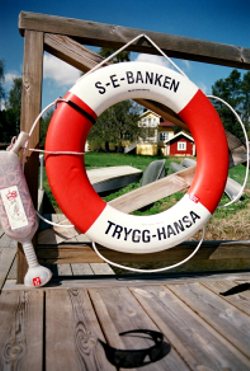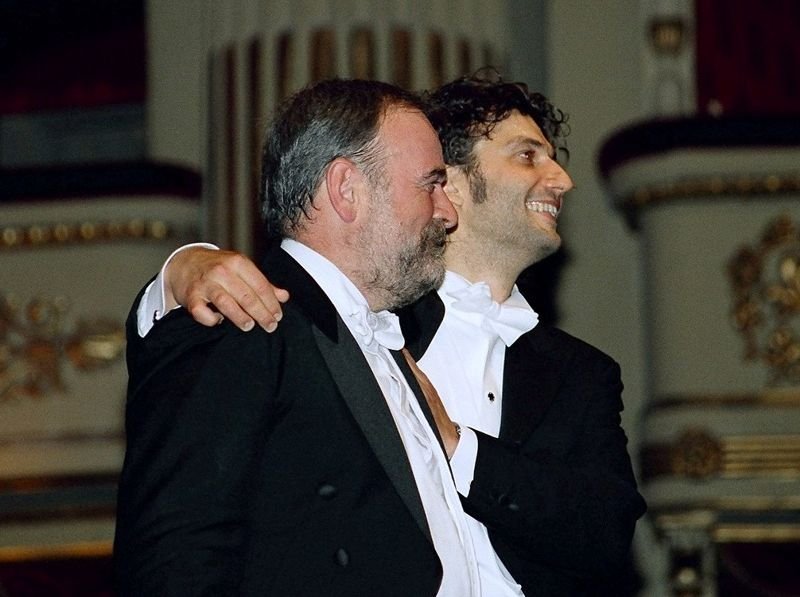|
|
|
| |
| |
| |
| |
| Diary, 2007-07-02 |
| |
| A wonderful day in the Mälar region,
while the rest of Sweden suffers from heavy raining. |
| |
| |
This seemed a good day to use my little reindeer filets
and the rest of the mushroom sauce preserved in the refrigerator. Drenched
the filets in a marinade, filled my rucksack with the essentials and
started for Polackstorp. Bought new potatoes and a nice bottle of
Portuguese red on the way.
 I
can no more have the place for myself. Holiday season is in and the place
is now attracting small families, mainly idle housewives with their
offspring. I am not disturbed, swam in the pool, found a secluded table
with a view of the lake and an adjacent chimney grill. The meat, so
tender, was fantastic with the mushrooms. Stretched out on the wooden
planks of the landing bridge with a plate of strawberries, I plugged in my
earphones and let the Walkman play Jonas Kaufmann’s Scala concert. I
can no more have the place for myself. Holiday season is in and the place
is now attracting small families, mainly idle housewives with their
offspring. I am not disturbed, swam in the pool, found a secluded table
with a view of the lake and an adjacent chimney grill. The meat, so
tender, was fantastic with the mushrooms. Stretched out on the wooden
planks of the landing bridge with a plate of strawberries, I plugged in my
earphones and let the Walkman play Jonas Kaufmann’s Scala concert.
This was my third listening and the most concentrated one. The situation
favoured good, undisturbed listening and my thoughts were flying. I was
back in my seat in the second row platea at La Scala. I remember so well
my reaction to the first number, the (to me) unknown ballad with the
charming, slightly naïve, but educating story. A quarter of an hour later
the singer had sung as many bars of music – or words - as you will find in
a normal tenor role from the Italian repertoire! Without the help of music
and text! And with a naturalness and conviction that made you think the
words came from the singer’s own imagination. This was no ordinary singer!
The contrast with the second item - the Britten-Michelangelo cooperation –
was striking. It revealed versatility and an acute sense of style. Even
the tone production seemed Italian, as was the vocal virtuosity in
handling difficult dramatic intervals and dynamics.
All the texts are now familiar to me after a number of listenings. I am
convinced that the German repertoire will be Jonas’ field of excellence.
His rendering of the Oberon aria is all that a Weber (or a Wagner) could
have dreamt of. His proficiency in languages is startling. I have heard
interviews in English and French which reveal remarkable intelligence
through a rich and varied vocabulary. His French as José is as good and
better than that of any non-french interpreter. I have a feeling that
beside the German/Austrian repertoire, French music could be his domain
and there are a number of roles in which I can hear his voice and artistry
to marvellous advantage.
It has been fascinating to follow Jonas’ career lately via Marion’s loving
work on the net. Reviews from London (Don José) and Paris (Alfredo) speak
of the beginning of a great career. Nothing made me more happy than the
appreciation written by André Tubeuf, who certainly knows what he is
speaking of. I liked especially what he said about repertory. Jonas
Kaufmann’s remarkable qualities include “intelligence” – never a
handicap in music – but indispensable in certain repertoire. There are so
many roles crying for an adequate interpreter, while there are too many
roles which find too many of them. Tubeuf named a few of the roles. I
would like to add one, after listening to Les Troyens the other day. I
cannot think of a more ideal Aeneas, vocally and scenically. The
great music of Berlioz should attract a person like Jonas Kaufmann.
In one interview Jonas says something very important and which is close to
my heart. Speaking of the Carmen rehearsals in London he expressed
satisfaction with the cooperation with conductor Pappano, who
admonished his Carmen to forget the conductor. “Sing! I am following
you.”
Such an admonishment could be catastrophic. Today most conductors in opera
come from the symphonic repertoire. They study their scores in their music
chambers and arrive at a preconceived interpretation of the orchestral
music to which the singers will have to adapt. In better times the
conductors were trained as Korrepetitors and conductors of repertory
performances in an opera house. The daily cooperation with singers made
all the difference.
Too few conductors today understand singing or realize that most of the
18th - 19th century repertoire was written for singers and that the
orchestral part - while becoming more refined and sophisticated – was
never the dominating feature. What they will not understand is that once
in a while they meet on the stage a person who is a greater musician than
themselves. Where the only reasonable thing for a conductor to do is “to
follow”, to accompany, to make music together. Let us be clear. It does
not happen all too often.
Jonas Kaufmann needs a sympathetic conductor. His varied phrasing, full of
inner life, is based on rubato and a rich scale of colours and dynamics.
Never excessive or vulgar, but it has to be realized and understood by the
co-musician – the conductor. The Scala cooperation with Helmuth Deutsch
shows what it is all about.

|
| |
Home again after some city shopping. My colour printer
eats cartridges. Two colours missing this morning.
A new DVD, fresh from the “oven” was waiting for me in the burner. An
early Hvorostovsky concert from Moscow of great interest. I realize
suddenly that we never see Russian TV in this country, where American
productions dominate. What are we missing? Especially in the cultural
field. The Rossini concerts given by Ewa Podles in Moscow and St
Petersburg in June, were they televised?
©
Olle |
| |
| |
| |
| |
|
|
|
|
|